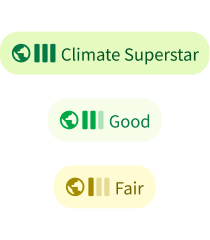HelloFresh has launched its climate labelling initiative in the UK, following a successful launch in Germany in November 2021. The new label was introduced in direct response to HelloFresh’s recent Life Cycle Assessment (LCA) that showed ingredients are by far the biggest contributor to emissions. The label is also now available in eight other European nations as well as Australia and New Zealand and includes recipes that produce up to 85 percent less CO2e emissions than the average HelloFresh recipe.
HelloFresh’s data shows that sustainability continues to be an important topic for customers across the UK, as well as across the world. An internal customer survey showed two thirds of HelloFresh customers in all markets wanted to know more about ingredient emissions.
Working with the independent research company HowGood, the climate impact of recipes has been measured by analysing key metrics including the amount of GHG emissions generated by the agricultural production and the food processing required to obtain the ingredients that customers find in HelloFresh recipes.
The climate label ranks 5 UK recipes, which is just over one in ten UK recipes, and guides customers towards more sustainable food choices. Within the UK, the labelled recipes have just over 70 percent less CO2e emissions than the average HelloFresh recipe.
In April 2022 HelloFresh published an in-depth life cycle assessment which analysed the environmental footprint across the whole value chain from field to fork. It showed that an average meal from HelloFresh has 25% lower CO2e emissions, compared to the exact same meal prepared with ingredients purchased from a supermarket.
Ingredients were also shown to be by far the biggest contributor to emissions, highlighting the importance of mapping the carbon emissions of recipes. The production of ingredients along the overall life cycle of a meal and every gram of food waste avoided means that CO2e emissions are saved when compared to supermarkets. This is due to a reduction in food waste, which creates methane when decomposing in landfills.
The avoidance of food waste associated with meal kits is a big differentiator compared to supermarkets, with a recently published research paper underlining that cooking with HelloFresh substantially reduces household food waste by 38 percent in comparison to traditionally cooked dinners.
“Our mission is to change the way people eat forever – empowering our customers to make choices that are right for them has always been at the core of that mission”, said Adam Park, CEO at HelloFresh UK. “Introducing the climate label is one of many steps we’re taking as part of our commitment to provide full menu transparency and to enable our customers to take back control when it comes to their food decisions.”
Making food supply and consumption sustainable is an integral part of HelloFresh’s business model. HelloFresh is committed to avoiding, reducing and offsetting carbon emissions wherever possible while continuously evaluating and measuring further actions. As part of this commitment, HelloFresh offsets 100% of its direct carbon emissions, the first meal box company to do so.
UK-owned recipe box company Green Chef is also part of the climate labelling rollout, with 20 per cent of its recipes to receive the label. Labelled recipes will on average have 65 per cent fewer emissions associated with them, further enabling customers to create environmentally friendly food choices.


